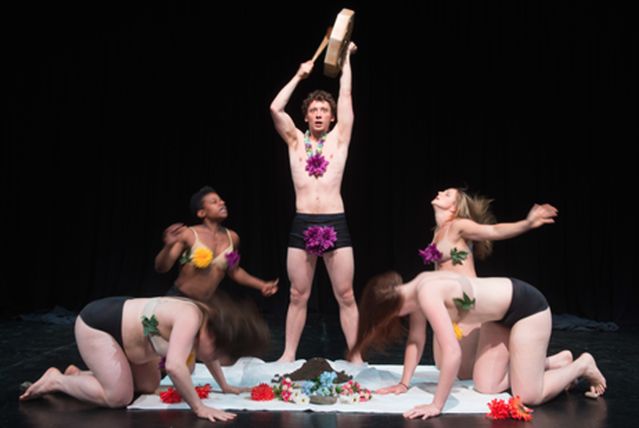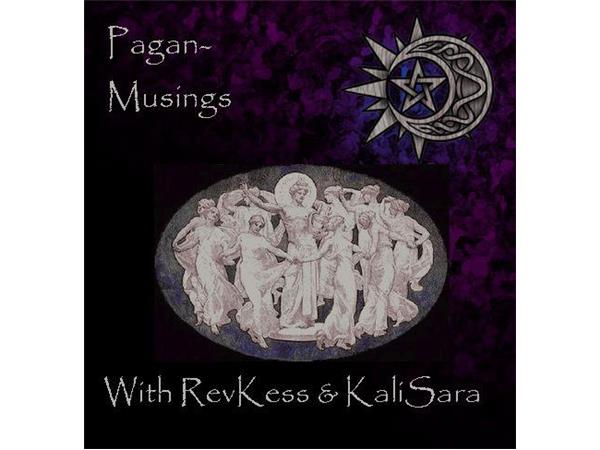
Jason Mankey is one of the great Pagan ritualists I’d like to the Pagan ritualist dinner in my head, together with Shauna Aura Knight, Steven Posch, and John Beckett. But I have to say I disagree with Jason when he says that “Bad ritual is still better than no ritual.” Jason’s recent post, “Do Your Bad Pagan Ritual” is a response to my last post here, “Gods Save Us from Bad Pagan Rituals: 10 Signs You’re Half-Assing Your Mabon Ritual”. I want to reply to some of his comments*:
‘I don’t think most forms of public Paganism were really designed for mass audiences. I think the Wiccan way of doing things (and it’s one of the types of ritual we see most often in public) is designed for eight to fifteen people, and anything more than that often takes away from the ritual structure’s power.”I can hear John arguing “well maybe they shouldn’t do it that way,” well maybe someone else would like to reinvent the wheel.’
Jason is right, I’m thinking exactly that: If Wiccanate** or Neo-Wiccan ritual forms don’t work for large groups, then why are we doing them that way?! Contemporary Paganism owes a great deal to Wicca, but sometimes that history can become a dead weight if we aren’t conscientious about it. It is possible to have a non-Wiccanate public Paganism. I don’t think we need to reinvent the wheel (or the Wheel), though. Contemporary Pagans have been inventing new ritual forms since the 1960s. And we have accounts of ancient pagan rituals to draw from as well.
‘I also think there’s sometimes an expectation of Wiccan-style ritual and to not have that creates even more confusion.’
So people have come to expect Wiccanate rituals? They’ve apparently come to expect half-assed rituals as well. That doesn’t mean we can’t or shouldn’t try something different.
And apparently, this needs to be said again: Wiccanate ritual is not another word for “generic Paganism”. If you think that you’re being inclusive by doing a Neo-Wiccan ritual where you cast a circle, call the quarters, etc., you’re fooling yourself. There’s no such thing as “generic Paganism”. Wiccanate rituals are tradition-specific, and they are bound to exclude some people. And that’s okay. A ritual that isn’t specific doesn’t deserve to be called a “ritual”. 100% inclusivity is not possible, and we shouldn’t even be trying for it. Whatever form your chosen ritual takes, don’t water it down. If you’re worried about alienating folks from other traditions, then just tell them what to expect and let them chose whether to participate or not.
‘Sure great leaders know how to adapt the Wiccan-formula, but public rituals are largely run by volunteers who are generally doing their best.’
I applaud the hard work done by volunteers as well. I’ve been there. I know how much time and energy goes into crafting a public ritual. However, I really don’t think we’re doing our best. I’ve seen mediocre rituals put on by people who have been Pagan longer than I have been alive. And I suspect that, in many of these instances, it’s not lack of skill, but lack of effort, that accounts for the poor quality of the ritual.
‘But the point of public rituals is not really transcendence, they are there to build community.’
What?!
First, let me point out that Jason is coming at this issue from the perspective of an initiated Wiccan. A lot of Wiccans draw a distinction between exoteric rituals, which include public rituals, and esoteric rituals, which are usually closed rituals for initiates. And some of these people are content with mediocre public Pagan rituals, because they have better quality rituals in smaller, closed groups. As Jason says, “The real work happens when the coven gathers and we close the door.”
But I don’t think the fact that you have quality private rituals is any excuse for bad public rituals. And the reality is that the majority of Pagans who attend public Pagan rituals don’t go home to a closed, initiatory group afterward, like Jason does. The public Pagan rituals are all they have. So we owe to to them to at least try to “knock their socks off”.
Second, who says that public rituals aren’t about transcendence?! Good rituals can be experienced on multiple levels at once. We can merge the exoteric and esoteric functions of ritual. Other religions do this: the Christian mass is a good example. Not every Christian will experience the mass as a mystical communion with God, but some will. The rest may experience it as a communion with the other Christians present.
Take any Wheel of the Year ritual. On one level (the exoteric or literal level), it is a celebration of the changing of the seasons and connecting with the Earth. On a deeper or “symbolic” level, the changing of the seasons is experienced as an outward metaphor of inward personal changes — like the human life-cycle or the highs and lows of our emotional lives. Through ritual, we recognize that change is unavoidable and that there is a season to all things, a winter and summer, both inside and out.
Taking this a little deeper still, to what we might call the “spiritual” level, Pagan ritual facilitates the incarnation, consecration, and integration the daemonic or shadow elements of our individual or collective psyche. And finally, on “mystical” level, Pagan ritual can be used to effect a (controlled) dis-integration of the ego. This is the ego-death and the oceanic sense of oneness that the mystics describe.
The separation of these levels into different rituals is precisely the problem with the exoteric-esoteric division drawn by some Wiccans. I agree with Jason, that the spiritual and mystical levels of ritual are more likely to be experienced in small groups of people that you trust, but it can happen in public rituals as well. And ritual planners should not rule out that possibility from the start. We should shoot for the moon, instead of planning for failure from the start.
Admittedly, community — real, deep community — can also be a kind of transcendence. There are many forms transcendence can take. If transcendence means connection with something “larger” than ourselves, that can be the gods, but it can also be the earth, or even just the other people in the room. But if all you really want is a “getting to know you space”, as Jason says, if all you want is to “enjoy the company of other Pagans”, then have a potluck or a game night. Why bother with a religious ritual, if it’s not going to be religious — as in re-ligare, re-connecting us with something transcendent?
‘My favorite coven rituals these days are when we have nothing planned. It’s just fourteen people in a room working on what they need to work on. Sometimes we have to find places to live, or new jobs, or perhaps one of our friends needs some healing. We don’t write anything out, we just do the work, often lead by my gorgeous wife who simply channels our Lady and knows exactly what to do. That comes with practice!’
I had several people respond to my last post saying that “you can do ritual in a hurry”. Yes, it is possible for rituals to evolve organically in a short period of time. I’ve been part of rituals that happened this way. But, this most often happens in groups that have a history of trust and practice together. And oftentimes these rituals only look effortless. In reality, there is skilled facilitation going on, which may be mostly invisible to the untrained eye. As Jason says above, “That comes with practice!” And it is a mistake to think that a novice can pull that off without putting in the necessary time and practice.
‘Re-use your God & Goddess calls, if they don’t completely suck no one will know. Sometimes if the atmospherics of the opening bits work like they are supposed to your middle “working” can totally suck and most people won’t even notice. Also, and this is especially true in public settings, if you build a good looking mousetrap a lot of newcomers won’t even notice that it didn’t catch any mice.’
Did he really just say that?! I’m sorry Jason, but that’s truly awful. You have really low opinion of the uninitiated. People will notice. And they do. Newcomers do know transcendence when they feel it, and they know when they don’t feel it. And that’s why they don’t come back.
‘Sure it’s great when we get to “feel something” during ritual, but that just doesn’t always happen.’
Unfortunately, Jason’s whole post actually seems to be geared toward lowering people’s expectations of public Pagan rituals. But honestly, I don’t think our expectations could get much lower. Obviously, not everyone is going to have the same reaction to a ritual. But if you craft a ritual for the lowest common denominator, you are planning for failure.
* Different bloggers have different feelings about naming other people by name in their writing. I don’t have any qualms about people naming me by name, as Jason did. And I’m taking his lead and naming him by name here as well.
** “Wiccanate” is a term coined by Johnny Rapture, and it refers to American Neo-Pagan theological ideas and liturgical forms common to large public Pagan gatherings and rituals, which are derived from Wicca, but are perceived to be “generic” or “universal” to Paganism. “Wiccan-Centric” is a related term. “Wiccanate privilege” is a phrase that has been going round in polytheist circles recently. It refers to the ways in which Wicca-inspired ritual and theology are assumed to be normative for Paganism as a whole.
















